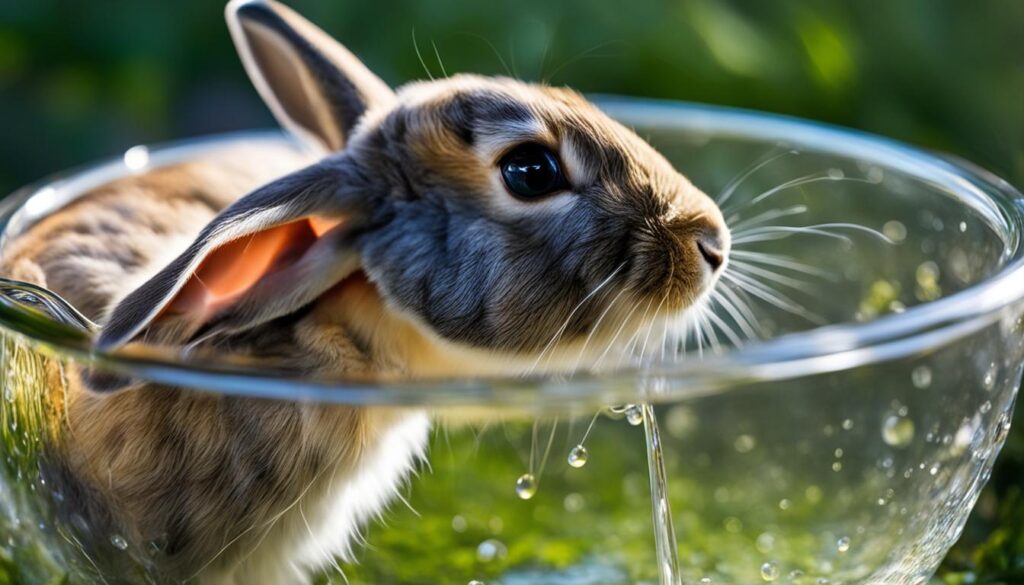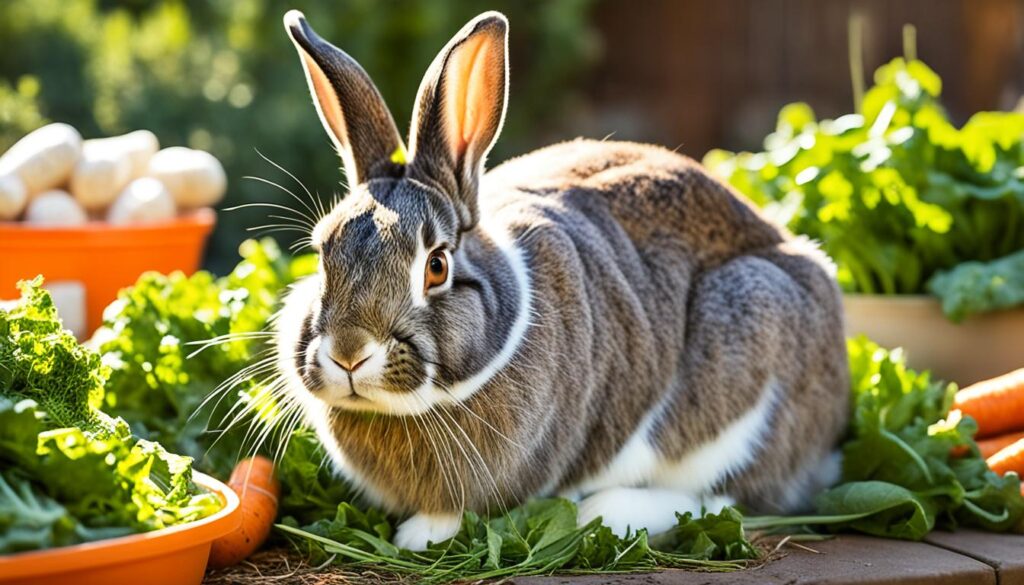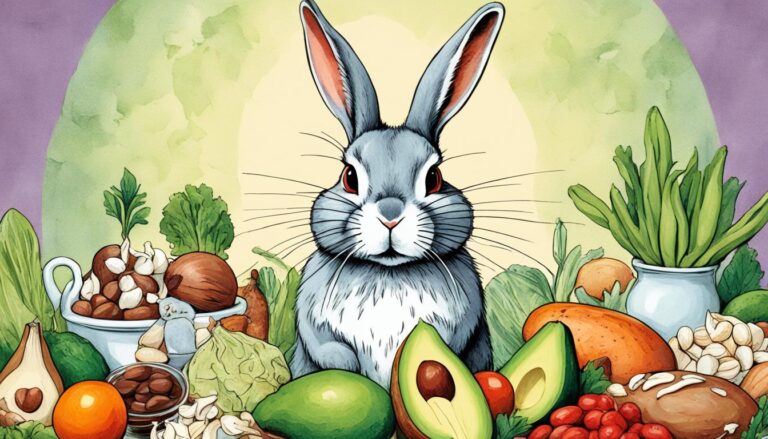Did you know that a rabbit’s or bunnies diet should consist mostly of hay? In fact, hay should make up the bulk of a rabbit’s daily food intake. But what other foods should you be feeding your furry friend to ensure they receive a balanced diet? In this comprehensive guide, I will take you through the essential components of a rabbit’s diet, including hay, fresh vegetables, and pellets. You’ll learn about safe vegetables to include, how often to feed your rabbit, and even tips on maintaining a healthy weight. So let’s dive in and discover how to provide the best nutrition for your rabbit!
Guide to Feeding Your Rabbit :Key Takeaways
- Hay should make up the majority of a rabbit’s diet and is essential for proper digestion and dental health.
- Timothy pellets should be offered in appropriate quantities based on the rabbit’s weight to prevent obesity.
- Fresh vegetables like romaine lettuce, carrot tops, and cilantro can be included to provide variety in the diet.
- Treats should be limited to small amounts of fresh fruit and vegetables.
- Monitor your rabbit’s eating habits and health to ensure they maintain a healthy weight and overall well-being.
What should rabbits eat?
Rabbits have specific dietary requirements to ensure their health and well-being. A proper rabbit diet consists of a combination of hay, fresh vegetables, and pellets. Let’s explore each of these components in detail.
The Importance of Hay
Hay should make up the majority of a rabbit’s diet. It provides the necessary fiber for proper digestion and helps maintain dental health. Grass hay, such as timothy, orchard, or brome, is an excellent choice. It allows rabbits to use their cheek teeth in a normal grinding motion and keeps their digestive system balanced. For young, growing rabbits, any type of grass hay, including alfalfa, is suitable. However, adult rabbits should avoid alfalfa hay due to its high protein and calcium content.
Pellets for Balanced Nutrition
Timothy pellets should be included in a rabbit’s diet in appropriate quantities. These pellets provide essential nutrients, but they should be offered in moderation to prevent obesity and soft stool. The amount of pellets should be determined based on the weight of the rabbit. Consult your veterinarian for specific guidelines regarding pellet portions.
Adding Fresh Vegetables
Leafy green vegetables are an excellent addition to a rabbit’s diet. Romaine lettuce, carrot tops, and cilantro are some safe options. However, it’s important to introduce new vegetables slowly and in small quantities. This allows you to monitor your rabbit for any digestive issues. Carrots should be fed sparingly due to their high carbohydrate content. Remember, variety is key to providing a healthy and balanced rabbit diet.
Here is a list of safe vegetables for rabbits:
- Romaine lettuce
- Carrot tops
- Cilantro
- Bok choy
- Mustard greens
- Watercress
- Basil
- Kohlrabi
- Beet greens
- Broccoli greens
Feeding Tips and Considerations
When feeding your rabbit, always remember the following:
- Monitor your rabbit’s weight and adjust the diet accordingly to prevent underweight or overweight conditions.
- Introduce new vegetables gradually to prevent digestive upset.
- Avoid feeding high-calorie treats like cookies, nuts, seeds, grains, and bread.
- Provide fresh water daily and ensure it is always clean. Some rabbits prefer water bowls, while others prefer sipper bottles.
- Consult with your veterinarian for specific dietary advice based on your rabbit’s individual needs and health.
By following these feeding tips and providing a balanced diet of hay, fresh vegetables, and pellets, you can ensure that your rabbit maintains a healthy and nourishing diet.
How often should I feed my rabbit?
Feeding your rabbit the correct amount of food is essential for their overall health and well-being. Let’s discuss the feeding schedule for rabbits and some helpful rabbit feeding tips to keep your furry friend happy and healthy.
The Importance of Daily Feeding
Rabbits should be fed and provided with fresh water every day. It’s important to establish a routine and consistency in their feeding schedule to maintain their digestive health. Daily feeding ensures that they receive the necessary nutrients and prevents any disruptions in their digestive system.
The Role of Hay in a Rabbit’s Diet
Hay is the cornerstone of a rabbit’s diet and should be available to them at all times. Rabbits are continuous grazers and need to have access to hay throughout the day. Hay provides essential fiber, aids in digestion, and helps maintain proper dental health by encouraging natural tooth grinding. It should make up the majority of their daily food intake.
Pellets in Moderation
Pellets are another important component of a rabbit’s diet, but they should be offered in appropriate quantities based on the rabbit’s weight. Avoid overfeeding pellets, as it can lead to obesity and soft stool. Follow the manufacturer’s guidelines and provide the recommended amount of pellets to ensure your rabbit receives a balanced diet.
Introducing Fresh Vegetables
Fresh vegetables are a great addition to a rabbit’s diet, but they should be introduced slowly and in small quantities. This allows their digestive system to adapt to new foods and prevents any digestive issues. Monitor your rabbit’s feces for any noticeable changes that may indicate an adverse reaction to certain vegetables.
Recommended Rabbit Feeding Schedule
| Food | Portion Size | Frequency |
|---|---|---|
| Hay | Unlimited | Available at all times |
| Pellets | 1/8 to 1/4 cup per 5 lbs of body weight | Once a day |
| Fresh Vegetables | Small quantities | Once a day |
Remember to always provide fresh, clean water and monitor your rabbit’s overall health and well-being. Observing their eating habits and the quality of their feces can help you ensure they’re receiving a balanced and appropriate diet.
Continue reading to learn about important vitamins and treats for rabbits in the next section.
What about vitamins and treats?
When it comes to the nutrition of rabbits, it’s important to understand their specific dietary needs. While rabbits can receive most of their necessary nutrients from a high-fiber diet of hay, vegetables, and pellets, there may be concerns about vitamins and treats for these furry friends.
Firstly, it’s essential to note that rabbits do not typically require extra vitamins if they have a well-balanced and varied diet. A combination of hay, vegetables, and pellets can provide them with the essential nutrients they need to thrive.
Treats, on the other hand, should be given sparingly and in small quantities. Fresh fruit and vegetables can be healthy treat options for rabbits. However, it’s crucial to avoid high-calorie treats like cookies, nuts, seeds, grains, and bread, as they can lead to weight gain and digestive issues.
Remember:
- Limit treats to small pieces of fresh fruit and vegetables.
- Avoid high-calorie treats that can cause weight gain.
- Stick to a varied and balanced diet for your rabbit’s overall health.
Before introducing new treats to your rabbit’s diet, it’s always a good idea to research and consult with a veterinarian. They can provide specific recommendations based on your rabbit’s individual needs and help ensure their diet remains healthy and beneficial.
Treats for Rabbits
Here is a table summarizing safe and healthy treat options for rabbits:
| Treat Options |
|---|
| Small pieces of fresh fruit (e.g., apple, pear, berries) |
| Small pieces of fresh vegetables (e.g., carrot, cucumber, bell pepper) |
How much water does a rabbit require?

Fresh, clean drinking water is essential for rabbits to maintain their hydration and overall health. It is crucial to provide them with access to water 24 hours a day. Some rabbits prefer water bowls, while others prefer sipper bottles. Rabbits should always have access to water, and it should be checked and filled with clean water on a daily basis. This ensures that they can quench their thirst whenever they feel the need. Furthermore, it is important to prevent the water source from getting clogged, as this can restrict their access to water.
Water plays a vital role in a rabbit’s digestion, helps regulate their body temperature, and keeps their skin and coat in good condition. It is imperative to monitor the water supply regularly, especially during the winter months, to prevent freezing and ensure that rabbits can remain hydrated. Additionally, it is essential to check the water for any signs of contamination, such as feces, as it can pose a risk to their health.
Why is hay important for rabbits?
When it comes to the health and well-being of your rabbit, hay plays a crucial role in their diet. It is not just a simple food source but an essential component that provides numerous benefits to their overall health.
High Fiber Content: Hay is rich in fiber, which is vital for maintaining a healthy digestive tract in rabbits. Fiber aids in proper digestion and helps prevent gastrointestinal issues such as bloating, gas, and GI stasis. Additionally, the high fiber content in hay stimulates the gut movement, ensuring a smooth and efficient digestive process.
Dental Health: Rabbits have continuously growing teeth, and chewing on hay helps them naturally wear down their teeth and prevents overgrowth. The abrasive texture of hay provides the necessary friction to grind down their teeth, promoting good dental health and preventing dental problems that can lead to pain, abscesses, and difficulty eating.
Preventing Hairball Blockages: Rabbits groom themselves regularly, and as a result, they may ingest loose fur. This can lead to the formation of hairballs in their digestive system, causing blockages and other complications. Hay acts as a natural “sweeper,” helping to move the hair through the digestive tract and preventing hairball blockages.
Foraging and Environmental Enrichment: Hay encourages rabbits’ natural foraging instincts and provides mental stimulation. Rabbits are naturally grazers, and having access to hay allows them to engage in their instinctual behavior, keeping them physically and mentally active. It also prevents boredom, which can lead to destructive habits and behavioral issues.
For a healthy rabbit diet, hay should make up the majority of their daily food intake. It is recommended to provide unlimited access to fresh, good-quality hay to ensure your rabbit’s well-being. Consider varieties such as timothy, orchard, or brome hay, which are suitable for rabbits and offer a diverse mix of textures and flavors.
What are safe vegetables for rabbits?
When it comes to feeding your rabbit a healthy and balanced diet, incorporating a variety of vegetables is essential. Not only do vegetables provide important nutrients, but they also add variety to your rabbit’s meals. Here are some safe vegetables that you can include in your rabbit’s diet:
| Safe Vegetables for Rabbits |
|---|
| Romaine lettuce |
| Bok choy |
| Mustard greens |
| Carrot tops |
| Cilantro |
| Watercress |
| Basil |
| Kohlrabi |
| Beet greens |
| Broccoli greens |
| Cilantro |
| Collard greens (in moderation due to high calcium content) |
| Dandelion greens (in moderation due to high calcium content) |
| Parsley (in moderation due to high calcium content) |
| Kale (in moderation due to high calcium content) |
| Swiss chard (in moderation due to high calcium content) |
| Escarole (in moderation due to high calcium content) |
| Broccoli |
| Green peppers |
| Brussels sprouts |
| Endive |
| Wheatgrass |
| Radicchio |
| Squash |
It’s important to introduce new vegetables slowly into your rabbit’s diet and monitor for any digestive issues. Additionally, make sure to wash all vegetables thoroughly before feeding them to your rabbit. By providing a variety of safe vegetables, you can ensure that your rabbit gets the necessary nutrients for a healthy diet.
What treats can rabbits have?
Treats for rabbits should be limited and consist of small pieces of fresh fruit and vegetables. While rabbits may enjoy the occasional treat, it’s important to remember that their main diet should consist of hay, fresh vegetables, and pellets to ensure they receive proper nutrition.
Fresh fruits and vegetables: Safe fruit options for rabbits include apple, pear, and berries. However, these should be given in limited quantities due to their sugar content. It’s best to cut the fruit into small, bite-sized pieces to avoid choking hazards. When it comes to vegetables, options like carrots, broccoli, and leafy greens can be a great source of vitamins and minerals for your rabbit. Just like with fruit, introduce new vegetables slowly to avoid digestive upset.
High-calorie treats to avoid: While it may be tempting to give your rabbit treats like cookies, nuts, seeds, grains, and bread, it’s important to resist the temptation. These treats are high in calories and can lead to weight gain and other health issues. Stick to fresh fruits and vegetables as the main treats for your rabbit.
If you’re unsure about what treats are safe for your rabbit, it’s always a good idea to consult with a veterinarian who can provide guidance based on your rabbit’s specific dietary needs.
Safe Treats for Rabbits
| Treat | Description |
|---|---|
| Apple | Fresh apple slices (without the seeds) make a sweet treat for rabbits. |
| Pear | Small pieces of ripe pear can be a tasty snack for rabbits. |
| Berries | Strawberries, raspberries, and blueberries are safe in small quantities. |
| Carrots | A small piece of carrot can be a crunchy treat for rabbits. |
| Broccoli | Steamed broccoli florets can provide vitamins and fiber for your rabbit. |
| Leafy greens | Romaine lettuce, spinach, and kale can be given as occasional treats. |
Remember, treats should only make up a small portion of your rabbit’s diet. Providing your rabbit with a balanced and healthy diet will contribute to their overall well-being and longevity.
How to maintain a healthy weight for your rabbit?

Ensuring that your rabbit maintains a healthy weight is crucial for their overall well-being. By monitoring their food intake and adjusting their diet as needed, you can help prevent them from becoming underweight or overweight. Here are some tips to help you maintain a healthy weight for your rabbit:
Monitor Portion Sizes
The quantity of food your rabbit needs depends on factors such as their age, lifestyle, and general health. It’s important to follow the feeding guidelines provided by the manufacturer for pellets and adjust portion sizes accordingly. Avoid the temptation to top up the bowl, as overfeeding pellets can lead to obesity and soft stool.
Consider Special Dietary Needs
If your rabbit is growing, pregnant, nursing, or underweight, they may require larger portions of food. Consult with a veterinarian to determine the specific dietary needs for your rabbit based on their individual circumstances.
Incorporate Hay into Their Diet
A healthy rabbit diet should include a significant amount of hay. Hay provides essential fiber and aids in proper digestion. It also helps maintain dental health by allowing rabbits to naturally wear down their teeth. Ensure that fresh hay is always available for your rabbit to nibble on throughout the day.
Offer a Variety of Vegetables
Incorporating fresh vegetables into your rabbit’s diet is beneficial, but be mindful of portion sizes and the types of vegetables you offer. Stick to safe options such as romaine lettuce, carrot tops, and cilantro. Introduce new vegetables slowly and monitor for any digestive issues that may arise.
Regular Exercise and Enrichment
In addition to a proper diet, ensure that your rabbit gets regular exercise to help maintain a healthy weight. Provide opportunities for physical activity, such as supervised playtime in a secure area. Also, give them chew toys and other forms of enrichment to keep them mentally stimulated.
| Feeding Tips | Healthy Rabbit Diet | Feeding Schedule for Rabbits |
|---|---|---|
| Monitor portion sizes | Incorporate hay into their diet | Provide fresh water daily |
| Consider special dietary needs | Offer a variety of vegetables | Feed hay continuously |
| Encourage regular exercise | Limit treats and sugary foods | Consult a veterinarian for specific dietary advice |
Maintaining a healthy weight for your rabbit is essential in promoting their overall health and longevity. By following these tips and consulting with a veterinarian, you can ensure that your rabbit receives a balanced and nutritious diet.
What should be avoided in a rabbit’s diet?
When it comes to feeding your rabbit, certain foods should be avoided to ensure their health and well-being. Here are some key items that should not be included in a rabbit’s diet:
Muesli-style foods
Muesli-style foods should be avoided as they are associated with health problems in rabbits. These foods typically consist of a mixture of different ingredients, and rabbits have a tendency to selectively feed on certain components, leaving out others. This can lead to an imbalanced diet and potential nutritional deficiencies. Additionally, the crunchy muesli pieces can contribute to dental issues in rabbits.
Foods that are toxic or pose a choking hazard
There are certain foods that are toxic to rabbits and should be strictly avoided. These include avocados, onions, garlic, iceberg lettuce, leeks, potatoes, mushrooms, rhubarb, and tomato leaves and stems. These foods can cause digestive issues, organ damage, or even be lethal to rabbits. It is important to keep these foods out of reach of your rabbit and ensure they cannot accidentally consume them.
In addition to toxic foods, certain items can pose a choking hazard to rabbits. These include small seeds, nuts, and pits from fruits. It is important to remove any potential choking hazards from your rabbit’s environment to prevent accidents.
Monitoring your rabbit’s diet and health
Properly monitoring your rabbit’s diet and overall health is crucial for ensuring their well-being. By paying attention to their eating habits and feces, you can identify any potential issues early on and take appropriate action. Here are some tips for effectively monitoring your rabbit’s diet and health:
Pay Attention to Eating Habits
Observe your rabbit’s eating habits on a daily basis. Note any changes in appetite or any sudden lack of interest in food. Changes in eating patterns could indicate underlying health problems, such as dental issues or gastrointestinal disturbances. If your rabbit is refusing to eat entirely, it’s essential to seek veterinary attention as soon as possible.
Monitor Fecal Quality
Regularly check the quality of your rabbit’s feces. Healthy rabbit droppings should be firm, round, and dry. Soft or sticky droppings that cling to your rabbit’s fur can indicate digestive issues or improper diet. If you notice changes in fecal consistency or if your rabbit stops producing droppings altogether, consult with a veterinarian for a proper diagnosis and treatment plan.
Ensure Access to Fresh Water
Make sure your rabbit has constant access to fresh, clean drinking water. Check their water supply daily to ensure it is clean and not contaminated with bedding, debris, or droppings. Rabbits need an ample supply of water to stay hydrated and maintain proper bodily functions. Dehydration can lead to serious health complications, so it’s crucial to provide clean water at all times.
Provide Chew Toys
Offer your rabbit a variety of chew toys to maintain their dental health. Rabbits’ teeth continuously grow, and chewing on appropriate toys helps wear them down naturally. Without access to chew toys, rabbits can develop dental problems that impede their ability to eat and lead to pain and discomfort. Choose chew toys made specifically for rabbits and monitor their condition regularly to ensure they remain safe and intact.
Schedule Regular Veterinary Check-ups
Regular veterinary check-ups are essential for monitoring your rabbit’s overall health. A veterinarian can conduct thorough examinations, check your rabbit’s weight, dental health, and provide guidance on appropriate diet and nutrition. They can also address any concerns you may have and offer personalized advice based on your rabbit’s specific needs. Stick to the recommended check-up schedule to stay proactive about your rabbit’s well-being.
By closely monitoring your rabbit’s diet and health and seeking veterinary assistance when needed, you can help ensure your furry friend lives a happy and healthy life.
| Signs of a Healthy Rabbit Diet | Red Flags to Watch Out For |
|---|---|
|
|
What are some common mistakes to avoid when feeding rabbits?
Some common mistakes to avoid when feeding rabbits include:
- Feeding Too Many Pellets: Giving bunnies too many pellets can make them chubby and cause tummy troubles. Stick to about one eggcup of pellets a day for a regular-sized rabbit.
- Giving Too Many Sweet Treats: Rabbits love sweet stuff, but too many carrots and fruits can upset their tummies. Treat them with these goodies in small amounts.
- Forgetting the Hay: Hay is like a salad for rabbits – they need it every day! Make sure they have plenty of fresh hay, like grass hay, to munch on.
- Not Enough Veggies: Bunnies need their veggies! Offer them a mix of fresh greens daily to keep them healthy and happy.
- Avoiding Processed Human Foods: Rabbit tummies aren’t fans of human snacks like cereal or bread. Stick to rabbit-friendly treats to keep them feeling good.
- Skipping Dental Care: Just like us, bunnies need grooming too! Regular brushing and nail trims are important for their health, especially for those with long fur.
- Providing the Right Home: Bunnies need space to hop and play! Make sure their living area is comfy and roomy, not cramped or with wire floors that can hurt their feet.
Conclusion
Feeding your rabbit a balanced and nutritious diet is crucial for their overall health and well-being. The ultimate guide to feeding your rabbit includes providing them with a combination of hay, fresh vegetables, and pellets.
Hay should make up the majority of your rabbit’s diet as it is rich in fiber, aids in proper digestion, and promotes dental health. Additionally, fresh vegetables should be introduced gradually and in small quantities to prevent digestive issues. It is important to offer pellets in appropriate amounts to avoid obesity while providing essential nutrients.
When it comes to treats, it’s best to limit them to small pieces of fresh fruit and vegetables. Avoid high-calorie treats that can lead to weight gain and digestive problems. Consistently monitoring your rabbit’s eating habits and health is vital in maintaining their optimal weight and overall well-being.
By following this guide to feeding your rabbit and implementing these rabbit feeding tips, you can provide your furry friend with a healthy and balanced diet that supports their nutritional needs and fosters a long and happy life.
FAQ
What should rabbits eat?
How often should I feed my rabbit?
What about vitamins and treats?
How much water does a rabbit require?
Why is hay important for rabbits?
What are safe vegetables for rabbits?
What treats can rabbits have?
How to maintain a healthy weight for your rabbit?
What should be avoided in a rabbit’s diet?
Monitoring your rabbit’s diet and health
Can bunnies or rabbits eat watermelon?
Yes, bunnies can eat watermelon in moderation. Watermelon is a refreshing treat that provides hydration and some vitamins, but it should be fed sparingly due to the high sugar content.
Can bunnies or rabbits eat strawberries?
Yes, bunnies can enjoy strawberries as an occasional treat. Strawberries are high in sugar, so they should be fed in small amounts as part of a balanced diet.
Can bunnies eat tomatoes?
Yes, bunnies can eat tomatoes, but only the fruit, not the leaves or stems, which can be toxic. Tomatoes should be introduced gradually and fed in moderation.
Can bunnies eat apples?
Yes, bunnies can eat apples, but they should be fed in small quantities due to the high sugar content. Remove the seeds and core before feeding.
Can bunnies eat cherries?
Yes, bunnies can eat cherries, but the pits should be removed as they can be a choking hazard. Cherries should be fed in moderation due to their high sugar content.
Can bunnies eat bananas?
Yes, bunnies can eat bananas, but they should be fed in small amounts due to the high sugar content. Bananas can be a healthy treat when used sparingly.
Can bunnies eat grapes?
Yes, bunnies can eat grapes, but they should be fed in moderation due to the high sugar content. Grapes can be a refreshing treat for bunnies.
Can bunnies eat blueberries?
Yes, bunnies can eat blueberries, which are a good source of antioxidants and vitamins. Blueberries should be fed in small amounts as part of a balanced diet.
Can bunnies eat carrots?
Yes, bunnies can eat carrots, which are a good source of fiber and vitamins. Carrots should be fed in moderation as part of a balanced diet.
Can bunnies eat broccoli?
Yes, bunnies can eat broccoli, which is a good source of fiber and vitamins. Broccoli should be introduced gradually and fed in moderation.
Can bunnies eat spinach?
Yes, bunnies can eat spinach, which is a good source of vitamins and minerals. However, spinach should be fed in moderation due to its high oxalate content.
Can bunnies eat kale?
Yes, bunnies can eat kale, which is a nutrient-dense leafy green. Kale should be introduced gradually and fed in moderation as part of a balanced diet.
Can bunnies eat lettuce?
Yes, bunnies can eat lettuce, but it should be limited to the darker, more nutrient-dense varieties like romaine or green leaf lettuce. Iceberg lettuce has little nutritional value.
Can bunnies eat cucumbers?
Yes, bunnies can eat cucumbers, which are a good source of hydration and fiber. Cucumbers should be fed in moderation as part of a balanced diet.
Can bunnies eat zucchini?
Yes, bunnies can eat zucchini, which is a good source of fiber and vitamins. Zucchini should be introduced gradually and fed in moderation.
Can bunnies eat bell peppers?
Yes, bunnies can eat bell peppers, which are a good source of vitamins and antioxidants. Bell peppers should be fed in moderation as part of a balanced diet.
Can bunnies eat pears?
Yes, bunnies can eat pears, but they should be fed in small amounts due to the high sugar content. Pears can be a healthy treat for bunnies.
Can bunnies eat oranges?
Yes, bunnies can eat oranges, but they should be fed in moderation due to the high sugar and acidity. The peel and seeds should be removed before feeding.
Can bunnies eat pineapple?
Yes, bunnies can eat pineapple, but it should be fed in small amounts due to the high sugar content. Pineapple can be a refreshing treat for bunnies.
Can bunnies eat mangoes?
Yes, bunnies can eat mangoes, but they should be fed in moderation due to the high sugar content. Mangoes can be a tasty treat for bunnies.
Can bunnies eat raspberries?
Yes, bunnies can eat raspberries, which are a good source of antioxidants and fiber. Raspberries should be fed in small amounts as part of a balanced diet.
Can bunnies eat blackberries?
Yes, bunnies can eat blackberries, which are a good source of vitamins and fiber. Blackberries should be fed in moderation as part of a balanced diet.
Can bunnies eat blueberries?
Yes, bunnies can eat blueberries, which are a good source of antioxidants and vitamins. Blueberries should be fed in small amounts as part of a balanced diet.
Can bunnies eat peaches?
Yes, bunnies can eat peaches, but they should be fed in moderation due to the high sugar content. Peaches can be a refreshing treat for bunnies.
Can bunnies eat plums?
Yes, bunnies can eat plums, but they should be fed in small amounts due to the high sugar content. Plums can be a tasty treat for bunnies.
Can bunnies eat nectarines?
Yes, bunnies can eat nectarines, but they should be fed in moderation due to the high sugar content. Nectarines can be a refreshing treat for bunnies.
Can bunnies eat apricots?
Yes, bunnies can eat apricots, but they should be fed in small amounts due to the high sugar content. Apricots can be a healthy treat for bunnies.
Can bunnies eat kiwi?
Yes, bunnies can eat kiwi, which is a good source of vitamins and fiber. Kiwi should be fed in moderation as part of a balanced diet.
Can bunnies eat pumpkin?
Yes, bunnies can eat pumpkin, which is a good source of fiber and vitamins. Pumpkin should be introduced gradually and fed in moderation.
Can bunnies eat sweet potatoes?
Yes, bunnies can eat sweet potatoes, which are a good source of fiber and vitamins. Sweet potatoes should be fed in moderation as part of a balanced diet.
Can bunnies eat green beans?
Yes, bunnies can eat green beans, which are a good source of fiber and vitamins. Green beans should be introduced gradually and fed in moderation.
Can bunnies eat asparagus?
Yes, bunnies can eat asparagus, which is a good source of fiber and vitamins. Asparagus should be introduced gradually and fed in moderation.
Can bunnies eat Brussels sprouts?
Yes, bunnies can eat Brussels sprouts, which are a good source of fiber and vitamins. Brussels sprouts should be introduced gradually and fed in moderation.
Can bunnies eat cauliflower?
Yes, bunnies can eat cauliflower, which is a good source of fiber and vitamins. Cauliflower should be introduced gradually and fed in moderation.
Can bunnies eat radishes?
Yes, bunnies can eat radishes, which are a good source of fiber and vitamins. Radishes should be introduced gradually and fed in moderation.
Can bunnies eat parsley?
Yes, bunnies can eat parsley, which is a good source of vitamins and minerals. Parsley should be fed in moderation as part of a balanced diet.
Can bunnies eat cilantro?
Yes, bunnies can eat cilantro, which is a good source of vitamins and minerals. Cilantro should be fed in moderation as part of a balanced diet.
Can bunnies eat basil?
Yes, bunnies can eat basil, which is a good source of vitamins and antioxidants. Basil should be fed in moderation as part of a balanced diet.
Can bunnies eat mint?
Yes, bunnies can eat mint, which can be a refreshing treat. Mint should be fed in moderation as part of a balanced diet.
Can bunnies eat rosemary?
Yes, bunnies can eat rosemary, which is a good source of antioxidants and vitamins. Rosemary should be fed in moderation as part of a balanced diet.
Can bunnies eat thyme?
Yes, bunnies can eat thyme, which is a good source of vitamins and minerals. Thyme should be fed in moderation as part of a balanced diet.
Can bunnies eat oregano?
Yes, bunnies can eat oregano, which is a good source of antioxidants and vitamins. Oregano should be fed in moderation as part of a balanced diet.
Can bunnies eat dill?
Yes, bunnies can eat dill, which is a good source of vitamins and minerals. Dill should be fed in moderation as part of a balanced diet.
Can bunnies eat sage?
Yes, bunnies can eat sage, which is a good source of antioxidants and vitamins. Sage should be fed in moderation as part of a balanced diet.
Can bunnies eat rosemary?
Yes, bunnies can eat rosemary, which is a good source of antioxidants and vitamins. Rosemary should be fed in moderation as part of a balanced diet.
Can bunnies eat lavender?
Yes, bunnies can eat lavender, which can have a calming effect. Lavender should be fed in moderation as part of a balanced diet.
Can bunnies eat chamomile?
Yes, bunnies can eat chamomile, which can have a calming effect. Chamomile should be fed in moderation as part of a balanced diet.
Can bunnies eat dandelion greens?
Yes, bunnies can eat dandelion greens, which are a good source of vitamins and minerals. Dandelion greens should be fed in moderation as part of a balanced diet.
Can bunnies eat timothy hay?
Yes, timothy hay should be the foundation of a bunny’s diet, as it is a good source of fiber and essential nutrients.
Can bunnies eat alfalfa hay?
Yes, bunnies can eat alfalfa hay, but it should be fed in moderation as it is higher in protein and calcium than timothy hay.
Can rabbits eat dandelion greens?
Yes, dandelion greens make wonderful supplements for rabbits and can be included in their diet to provide additional nutrients.
Can rabbits eat romaine lettuce?
Romaine lettuce is a safe and healthy option for rabbits to consume as part of their diet.
Can rabbits eat bok choy?
Bok choy is a suitable green vegetable that can be fed to rabbits as a supplement to their diet.
Can rabbits eat green carrot tops?
Green carrot tops are nutritious and can be given to rabbits as part of their diet.
Can rabbits eat kohlrabi?
Kohlrabi is a vegetable that can be included in a rabbit’s diet to provide variety and essential nutrients.
References on Bunnies or Rabbits
| Organization | Website URL |
| House Rabbit Society (HRS) | https://rabbit.org |
| Rabbit Welfare Association and Fund (RWAF) | https://rabbitwelfare.co.uk |
| RSPCA (Royal Society for the Prevention of Cruelty to Animals) | https://www.rspca.org.uk/adviceandwelfare/pets/rabbits |
| Vancouver Rabbit Rescue and Advocacy (VRRA) | https://vrra.ca |





